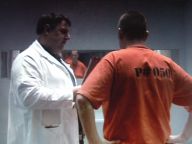Setting up
A critical part of our ethical plans was to build proper safeguards and proper scrutiny into the study to ensure nothing went wrong.
There were three layers to this:
First, there were two independent clinical psychologists who were present or on call 24 hours a day. They had the power to intervene and to remove anyone from the study if they thought they were in distress.
Second, we had paramedics and security guards on hand and ready to intervene at a moment’s notice if anything untoward happened in the study.
Third, the study was constantly monitored by members of a five-person independent ethics panel. This was chaired by a Member of Parliament and also included members of the Holocaust Educational Trust, the Howard League for Penal Reform, the BBC’s Independent Editorial Policy Unit and a senior academic psychologist. This committee had the power to change the way the study as a whole was run and to terminate it if they had ethical concerns.
In the end neither the clinical psychologists, the security guards nor the ethics panel had to intervene. Indeed, after the study had ended the panel wrote an independent report in which they described the ethical conduct of the study as “exemplary”.
